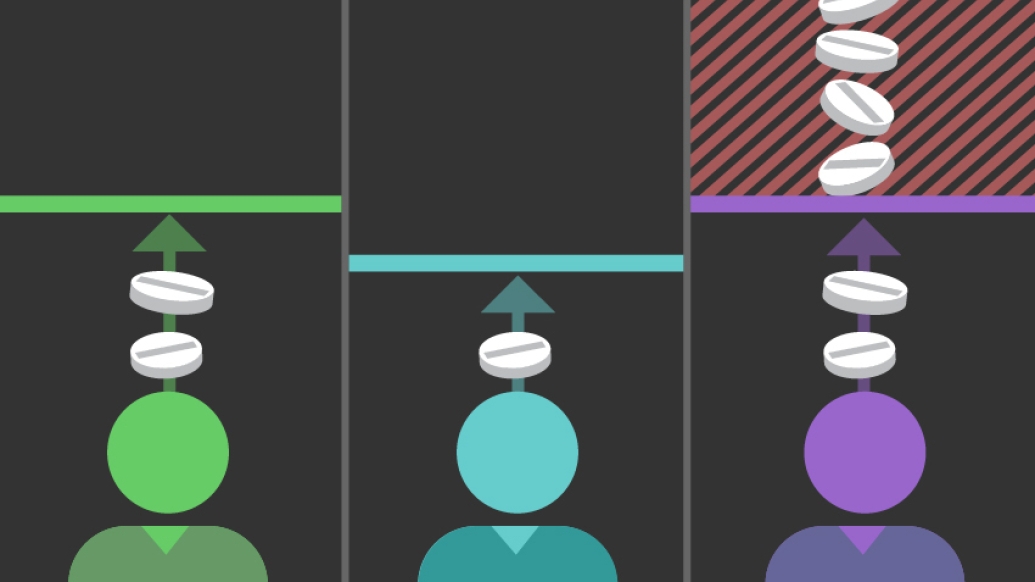New research from Michigan Medicine could help clinicians identify which patients are more likely to continue to use opioids after surgery recovery.
10:36 AM
Author |

Surgeons wielding their life-saving scalpels, laparoscopic tools, or other implements to repair or remove what ails their patients, understand all too well that pain is an unavoidable part of the healing process. Yet the current opioid crisis has made the standard prescribing practices for these highly effective analgesics fraught with risk.
LISTEN UP: Add the new Michigan Medicine News Break to your Alexa-enabled device, or subscribe to our daily updates on iTunes, Google Play and Stitcher.
New research from Michigan Medicine could help clinicians mitigate that risk by identifying which patients are more likely to continue to use opioids after their immediate recovery period.
"There is not much research on which surgical patients require more or less opioids, despite a push in the field for personalized medicine," says first author Daniel Larach, M.D., M.T.R., M.A., a resident at U-M at the time of the study and now assistant professor of clinical anesthesiology at the University of Southern California. "Often with postoperative opioid prescribing, personalization falls by the wayside, with surgeons using the same amounts for every person receiving a certain procedure."
SEE ALSO: Why One Pain Specialist Hasn't Prescribed an Opioid in 10 Years
He and the study team looked at data for more than 1,000 people undergoing an elective hysterectomy, thoracic surgery, or a total knee or hip replacement. Before their procedures, each patient provided demographic information and filled out several screening questionnaires. They were given scores measuring their degree of depression, anxiety, fatigue, sleep disturbance, physical function, as well as the severity of their overall and surgical site pain. The research team also measured how many pills were prescribed per patient. Each patient was then contacted one month following surgery to assess how many opioid pills they had consumed.
I think it is striking that you see once again that the more you prescribe, the more patients take, even after adjusting for all of these other risk factors.Chad Brummett, M.D.
"We found that anxiety is linked with more opioid use, which is disheartening to see but also heartening in the sense that this is something we could potentially target," says Larach.
Other patient factors linked to increased opioid use included younger age, non-white race, no college degree, alcohol and tobacco use, and sleep disturbance.
Chad Brummett, M.D., associate professor of anesthesiology and director of anesthesia clinical research and pain research, says people may be knowingly or unknowingly medicating for other conditions.
"The only thing we're giving them is opioids and we're not giving them alternatives or other options," he says. For example, patients with high anxiety around the time of surgery could be offered behavioral care or other non-opioid medications for anxiety and resulting pain.
MORE FROM MICHIGAN: Sign up for our weekly newsletter
Brummett, senior author on the Annals of Surgery paper, also notes that this study found overprescription of opioids for all surgical procedures and a correlation between the prescription size and use.
"I think it is striking that you see once again that the more you prescribe, the more patients take, even after adjusting for all of these other risk factors," explains Brummett.
In fact, a separate new study published in the Annals of Thoracic Surgery and led by U-M's Alexander A. Brescia, M.D., a cardiothoracic surgery resident, found prescription size and timing of prescribing were the factors most strongly associated with persistent use of opioids up to six months following heart surgery.
Larach and Brummett note that right-sizing prescriptions through initiatives such as the Michigan Opioid Prescribing Engagement Network (OPEN), which provides recommendations for prescription amounts for various medical procedures, is a critical first step. But, they say, this step should be followed by more research into specific patient factors that can be addressed in other ways.
Says Brummett, "We are asking surgeons to learn about and think about pain and behavioral health in ways that we have not previously done. It will require an open mind."
For more information on Dr. Brescia's study, read the press release by the Society of Thoracic Surgeons.
Papers cited:
Brummett, C., Larach, D., et al. "Patient Factors Associated with Opioid Consumption in the Month Following Major Surgery" Annals of Surgery. DOI: 10.1097/SLA.0000000000003509
Brescia, A., et al. "Impact of Prescribing on New Persistent Opioid Use After Cardiothoracic Surgery" Annals of Thoracic Surgery. DOI: 10.1016/j.athoracsur.2019.06.019

Explore a variety of healthcare news & stories by visiting the Health Lab home page for more articles.

Department of Communication at Michigan Medicine
Want top health & research news weekly? Sign up for Health Lab’s newsletters today!





